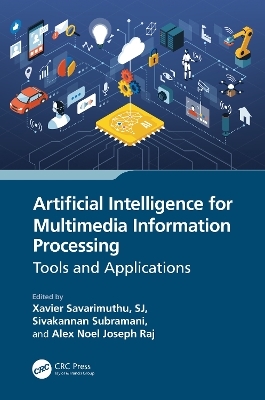
Artificial Intelligence for Multimedia Information Processing
CRC Press (Verlag)
978-1-032-52147-3 (ISBN)
Advances in artificial intelligence (AI), widespread mobile devices, internet technologies, multimedia data sources, and information processing have led to the emergence of multimedia processing. Multimedia processing is the application of signal processing tools to multimedia data—text, audio, images, and video—to allow the interpretation of these data, particularly in urban and smart city environments. This book discusses the new standards of multimedia and information processing from several technological perspectives, including analytics empowered by AI, streaming on the intelligent edge, multimedia edge caching and AI, services for edge AI, and hardware and devices for multimedia on edge intelligence.
FEATURES
Covers a wide spectrum of enabling technologies for AI and machine learning for multimedia and information processing
Includes many applications using AI, from robotics and driverless cars to environmental, human health, and remote sensing
Presents an overview of the fundamentals of AI and multimedia processing: imaging, signal, and speech
Explains new models and architectures for multimedia streaming, services, and caching for AI
Discusses the emerging paradigms of the deployment of hardware and devices for multimedia on edge intelligence
Gives recommendations for future research in multimedia and AI
This book is written for engineers and graduate students in image and signal processing, information processing, environmental engineering, medical and public health, etc., who are interested in machine learning, deep learning, and multimedia processing.
Dr. Xavier Savarimuthu, S.J., is a Professor of environmental science at St. Jospeh’s University, Bengaluru, India and the Central Library AI digitization director. Prior to this position he was the Vice-Principal and Head of the Department of Environmental Studies at St. Xavier’s College, Kolkata, India. He has given invited lectures in Stockholm, Sweden; Manila, Philippines; Paris, France; Bonn, Germany; and at the University of Oxford, England. He has taught at Santa Clara University, California, and Saint Joseph’s University, Philadelphia, where he held the endowed MacLean Jesuit Chair. He has published 2 books, many research articles in various international journals, and has presented his research works in several international conferences. Dr. Sivakannan Subramani is Assistant Professor in St. Joseph’s University, Bangalore, India. In 2018 he completed his PhD in Medical Image Processing, at the Department of Electronics & Instrumentation Engineering, Annamalai University, India. He has more than ten years of academic and research experience, primarily working on predictive analytics and machine learning. He has completed public funded research projects for Indian Space Research Organization (ISRO) and Defense Research and Development Organization (DRDO). He has published research articles in various international journals and has presented his research in several international conferences. Dr. Alex Noel Joseph Raj works at the Department of Electronic Engineering, College of Engineering, Shantou University, China. Prior to this he was Design Engineer at Valeport Ltd Totnes, UK and professor at the Department of Embedded Technology, School of Electronics Engineering, VIT University, Vellore, India. He received his Ph.D. degree in Engineering from the University of Warwick, Coventry, UK in 2009. His research focuses on Machine Learning, Signal and Image Processing and FPGA implementations. He has published research articles in various international journals and has presented his research in several international conferences.
Section I: AI-Multimedia Information Processing. 1. Monitoring Ancient Buildings Using UAV and Instant Image Segmentation Using Masked R-CNN. 2. AI-Assisted Digital Forensics for Securing Industry 4.0 Assets. 3. State-of-the-Art Analysis in Reversible Data Hiding Techniques. 4. The Intelligent Research Laboratory: Artificial Intelligence/Machine Learning Methods for Chemists. Section II: AI and Its Applications in Public Health. 5. MLACP 2.0: Utilizing Machine Learning to Predict Anticancer Peptide Activity from Protein Peptide Patterns. 6. An AI-Based Diagnostic System to Predict BI-RADS Scores for Detecting Breast Cancer over Mammograms. 7. Optimization Techniques and Their Applications in Prenatal Congenital Heart Defects: A Survey. 8. Analyzing Aortic Stenosis Diagnosis and Medication with Artificial Intelligence. 9. A Study of the Role of Artificial Intelligence in Monitoring Environmental and Health Issues in the Post-COVID-19 Pandemic Era for Sustainable Living. 10. Cerebral Palsy Detection Using Vision Impairment and Machine Learning. 11. ECG-Based Diagnosis of Sudden Cardiac Death Using Machine Learning. Section III: AI and Its Applications in Environmental Science. 12. AI in Environmental Applications. 13. Automation of Adsorption Processes Using AI: Recent Trends and Prospects. 14. Application of Machine Learning Algorithms in the Field of Bioacoustics. Section IV: AI and Its Applications in the Automobile Industry. 15. Driverless Car Using AI. Section V: AI and Computer Vision. 16. Comparative Analysis of Feature-Based Image Stitching Algorithms. Section VI: AI and Its Applications in Material Science. 17. Revolutionizing Concrete Engineering: Predicting Material Properties with AI Insights.
| Erscheinungsdatum | 13.06.2024 |
|---|---|
| Zusatzinfo | 32 Tables, black and white; 49 Line drawings, black and white; 20 Halftones, black and white; 69 Illustrations, black and white |
| Verlagsort | London |
| Sprache | englisch |
| Maße | 156 x 234 mm |
| Gewicht | 453 g |
| Themenwelt | Informatik ► Theorie / Studium ► Künstliche Intelligenz / Robotik |
| Naturwissenschaften ► Geowissenschaften ► Geologie | |
| Technik ► Bauwesen | |
| Technik ► Umwelttechnik / Biotechnologie | |
| ISBN-10 | 1-032-52147-3 / 1032521473 |
| ISBN-13 | 978-1-032-52147-3 / 9781032521473 |
| Zustand | Neuware |
| Haben Sie eine Frage zum Produkt? |
aus dem Bereich


